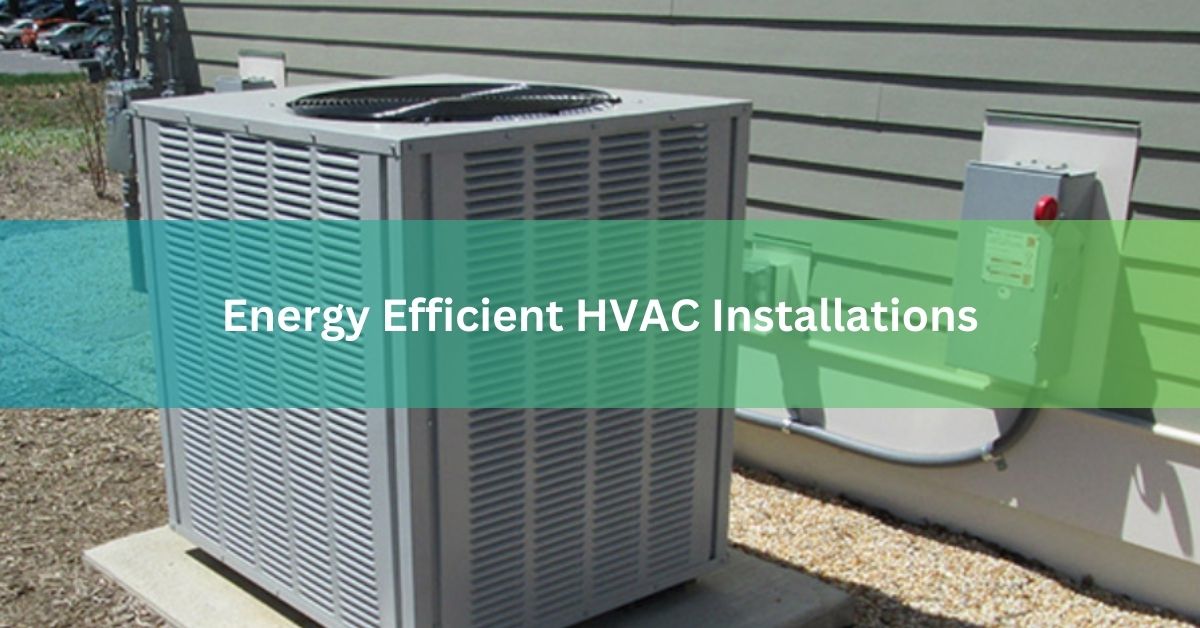Energy Efficient HVAC Installations
An energy-efficient HVAC system is designed to use less energy while providing the same comfort and functionality as traditional alternatives.
These systems often incorporate advanced technologies and designs that optimize their performance and minimize waste.
By focusing on energy-efficient HVAC installation, you can promote optimal performance and longevity of your system while contributing to environmental sustainability.
Benefits of Energy-efficient HVAC Installations
Professional HVAC companies install and service energy-efficient HVAC units to customize the heating and cooling in your home. Investing in an efficient HVAC system has several advantages, from enhanced comfort to improved air quality. Here are some benefits of these systems:
Enhanced Comfort
Modern HVAC systems are designed with advanced technology, allowing superior control over indoor temperature and humidity levels. An energy-efficient HVAC system can maintain a consistent and comfortable indoor environment regardless of external weather conditions.
This temperature uniformity addresses the issue of hot or cold spots within a building. These systems also have advanced thermostats for precise control over your comfort settings.
Delivering consistent comfort can benefit residents, making living or working conditions more pleasant throughout the year.
Reduced Carbon Footprint
Traditional HVAC systems may consume substantial gas and electricity, leading to high carbon emissions. Energy-efficient HVAC systems can reduce this consumption, lessening carbon emissions.
Technologies like variable-speed compressors and modulating burners allow the HVAC unit to adjust its output based on the home’s current requirements. This helps avoid unnecessary energy consumption during periods of low demand.
Improved Indoor Air Quality
New HVAC systems can be equipped with advanced filtration and ventilation mechanisms. This effectively removes air pollutants such as volatile organic compounds and carbon particles. Circulating filtered or purified air throughout the building helps maintain a healthier indoor environment.
This may lead to fewer allergens and irritants in the air, which benefits individuals with allergies or respiratory conditions.
How To Achieve Energy-efficient HVAC Installations
Efficient HVAC installations involve several steps, from choosing a unit to testing its functionality in your home.
Professional technicians are trained to recommend suitable appliances, equipment modifications, and maintenance schedules for your new system. Here is more information about achieving an energy-efficient HVAC installation:
Choose a Suitable Size
An oversized or undersized system can lead to inefficiency and increased energy usage. The size of the HVAC system should be determined by factors such as the square footage of the space, the number of rooms, insulation levels, and the local climate.
An appropriately sized HVAC system can operate more efficiently, maintaining a consistent temperature while providing better humidity control. This results in less energy consumption and lower utility bills. Consult an HVAC professional to determine the most appropriate size for your home needs.
Select High-efficiency Equipment
When planning an HVAC installation, prioritize the selection of high-efficiency equipment such as furnaces, air conditioners, heat pumps, and ventilation systems. Look for equipment with high Seasonal Energy Efficiency Ratio (SEER) and Annual Fuel Utilization Efficiency (AFUE) ratings.
These indicate superior energy performance. Invest in variable-speed equipment that can adjust its output based on the actual heating or cooling demand, further optimizing energy usage.
Conduct Proper Installation and Regular Maintenance
A correctly installed system can make sure that the HVAC unit runs per the manufacturer’s specifications, optimizing its performance and energy use. Improper installation may lead to inefficiencies, reducing the system’s lifespan and increasing service costs.
Schedule regular maintenance to confirm that the system operates at peak performance. This helps prevent energy wastage. Maintenance tasks include replacing or cleaning air filters and checking ductwork. By investing in routine inspections and cleanings, you can enhance your system’s longevity, safety, and energy efficiency.
Work With an HVAC Installation Specialist
Investing in an energy-efficient HVAC installation is beneficial for the environment and your comfort. By understanding what makes an HVAC system energy-efficient and how to achieve it, you can make an informed investment that pays off in the long run.
Working with an HVAC installation specialist is an effective way to attain energy-efficient HVAC installations. These professionals provide a comprehensive approach that verifies the system is correctly installed, optimized for performance, and ready to deliver energy savings.







